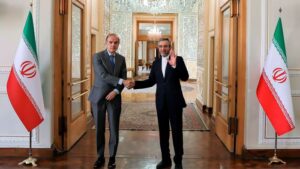UPSC Relevance
- GS-2: International Relations (West Asia crisis, nuclear proliferation, global policies affecting India)

Key Points
- Indirect U.S.-Iran talks, mediated by Oman, aim to revive the 2015 Iran nuclear deal (JCPOA).
- The Trump administration’s 2018 withdrawal led Iran to exceed the deal’s nuclear limits.
- Current negotiations focus on sanctions relief for Iran and restrictions on its nuclear program.
- Israel and Saudi Arabia’s concerns complicate the talks.
Detailed Insights
- The JCPOA curbed Iran’s uranium enrichment in exchange for sanctions relief.
- The U.S. is willing to rejoin if Iran complies, but Israel opposes the deal, fearing Iran’s nuclear ambitions.
- Regional conflicts, like Yemen, influence the negotiations.
Significance
- The talks’ outcome will shape Middle East nuclear proliferation and geopolitics.
- A revived deal could reduce tensions, while failure risks escalation.
Analysis & Way Forward
- Both sides must show flexibility to revive the JCPOA.
- Engaging regional stakeholders and ensuring robust verification mechanisms are key.
- Addressing Iran’s nuclear activities transparently will build trust.




